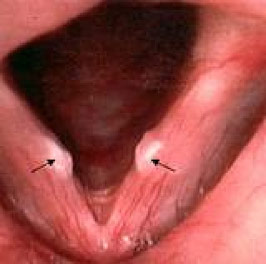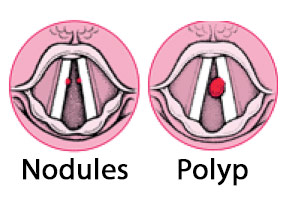- Vocal Fold Nodules - September 6, 2013
The term “nodules” is most often associated with singers and is actually one of the most feared problems among singers. People may feel that if they do not sing, they cannot get vocal fold nodules. This is not true. Nodules can begin form in anyone, from simple activities such as cheering on your favorite sports team during an important game.
What are vocal fold nodules?
A nodule is a small inflammatory or fibrous/scarred mass that occurs on both vocal cords, usually at the midpoint of the cord. Nodules usually cause hoarseness of the voice, and most commonly occur in women between the ages of 20 to 50 years. They affect the voice by interrupting the ability of the vocal folds to vibrate.

How do you get vocal fold nodules?
Nodules most frequently occur from overuse, misuse, or abuse of the voice and vocal folds. Vocal abuse leads to swelling of the vocal cords. When vocal cords are swollen and then they are used (i.e., to speak, shout, or sing), nodules may form due to the friction on the swollen cords. Swelling may occur from any of the following activities:
- Smoking
- Singing
- Yelling
- Talking loudly
- Drinking caffeine and alcohol
- Having tense muscles of speech
- Having allergies
How do you know you have vocal fold nodules?
Someone suffering from nodules would experience the following symptoms
- Hoarseness
- Breathiness
- A “rough” voice
- A “scratchy” voice
- A “lump in the throat” sensation
- Neck pain
- Decreased pitch range
- Voice fatigue
The only way to be sure if you have nodules is to have videostroboscopy performed by a laryngologist.
How do you treat vocal fold nodules?
Voice therapy with a skilled voice therapist is the most effective way to get rid of their nodules. This includes learning good vocal hygiene and how to take care of the voice. Unfortunately, if a nodule has existed for a long time or is very big, it may need surgical treatment. This, however, is extremely rare and should make the patient question the true diagnosis. A laryngologist (voice doctor) is the only qualified professional who can make a definitive diagnosis using videostroboscopy.
What is the difference between vocal fold nodules and polyps?
Polyps are also most commonly caused by voice abuse/overuse. Unlike nodules, they more commonly occur on one vocal cord only. Polyps may appear, like nodules, as a swelling or bump if only flexible laryngoscopy is used for diagnosis. Videostroboscopy is required to determine the true effect of the lesion on the vocal cords.. Polyps are often bigger than nodules. A good way to think about the difference between nodules and polyps is to think of a nodule as a callous and a polyp as a blister.

Nodules can occur in anyone who uses their voice frequently and should be considered whenever hoarseness persists for more than 2 weeks. If you are persistently hoarse, seek evaluation by a qualified laryngologist to better understand the reason for your hoarseness.
To learn more about the voice, click here.



